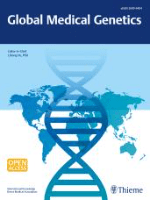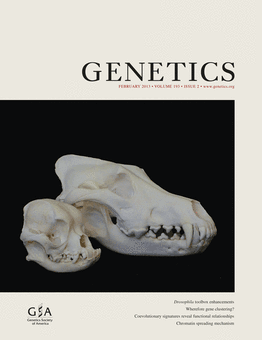
EUROPEAN JOURNAL OF HUMAN GENETICS
Scope & Guideline
Connecting Researchers in the Field of Human Genetics
Introduction
Aims and Scopes
- Genetic Disorders and Syndromes:
The journal publishes studies on the genetic basis of various disorders and syndromes, including rare diseases, neurodevelopmental disorders, and hereditary conditions, emphasizing the identification of novel genetic variants and their clinical implications. - Population Genetics and Epidemiology:
Research focusing on the genetic epidemiology of diseases, including studies on population-specific genetic variants, risk factors, and the influence of genetics on disease prevalence across different populations. - Genomic Medicine and Precision Health:
EJHG highlights advancements in genomic medicine, including the application of whole genome sequencing, exome sequencing, and the development of genetic testing strategies for better diagnosis, treatment, and prevention of diseases. - Ethical, Legal, and Social Implications (ELSI):
The journal addresses the ethical, legal, and social considerations surrounding genetic testing, data sharing, and the implications of genetic research for individuals and communities. - Innovative Technologies and Methodologies:
EJHG promotes research that employs cutting-edge technologies such as CRISPR, long-read sequencing, and bioinformatics tools for genetic analysis, providing insights into the mechanisms of genetic disorders.
Trending and Emerging
- Integration of Multi-Omics Approaches:
There is a growing emphasis on multi-omics approaches that combine genomics, transcriptomics, proteomics, and metabolomics to provide a comprehensive understanding of complex diseases and their underlying biological mechanisms. - Focus on Health Disparities and Population Diversity:
Research exploring genetic health disparities and the genetic diversity of underrepresented populations is gaining momentum, highlighting the need for inclusive research practices that account for genetic variation across different ethnic groups. - Ethical Considerations in Genetic Research:
The discourse around the ethical implications of genetic research, including consent, data privacy, and the impact of genomic findings on individuals and families, is becoming increasingly prominent, reflecting societal concerns regarding genetic technologies. - Application of Artificial Intelligence in Genetics:
The use of AI and machine learning tools for variant interpretation, predictive modeling, and personalized medicine is emerging as a significant trend, providing new avenues for enhancing genetic diagnostics and treatment strategies. - Neurodevelopmental and Psychiatric Genetics:
Research focusing on the genetic basis of neurodevelopmental and psychiatric disorders is expanding, with increased interest in understanding the genetic architecture and environmental interactions influencing these conditions.
Declining or Waning
- Basic Genetic Mechanisms:
There has been a noticeable decline in publications focused solely on basic genetic mechanisms without direct clinical applications, as the field shifts towards more translational research that connects genetic findings with clinical outcomes. - Single-gene Disorders:
Research specifically centered on single-gene disorders seems to be diminishing in favor of studies addressing complex interactions and polygenic influences on diseases, reflecting a broader interest in multifactorial conditions. - Traditional Cytogenetic Techniques:
The reliance on traditional cytogenetic techniques such as karyotyping is decreasing, as newer technologies like next-generation sequencing and optical genome mapping gain traction for their enhanced diagnostic capabilities.
Similar Journals

AMERICAN JOURNAL OF MEDICAL GENETICS PART A
Illuminating Genetic Pathways for Better HealthAmerican Journal of Medical Genetics Part A, published by Wiley, is a vital resource for those immersed in the field of medical genetics. Established as a premier platform for interdisciplinary scholarship, this journal offers insights into the latest advances in genetic research, specifically focusing on clinical applications. With an ISSN of 1552-4825 and an E-ISSN of 1552-4833, it is recognized in the academic community with a noteworthy Q2 ranking in Genetics and Q3 in Clinical Genetics for 2023, reflecting its significant contribution to the field. The journal encompasses a broad scope of topics, from genetic disorders to the implications of genetic findings in clinical practice, and it has consistently attracted high-quality research submissions. Researchers and professionals can freely access its articles due to open access options, promoting the dissemination of knowledge globally. As it converges from its historical foundation established from 1996 to 1999 and 2001, continuing through to 2024, the American Journal of Medical Genetics Part A remains a crucial conduit for new scientific knowledge necessary for advancing genetic medicine.

GENETICS AND MOLECULAR RESEARCH
Illuminating the Pathways of Genetic DiscoveryGENETICS AND MOLECULAR RESEARCH is a distinguished academic journal published by FUNPEC-EDITORA, focusing on the rapidly evolving fields of genetics and molecular biology. Since its inception in 2002, the journal has provided a platform for high-quality research and advancements that contribute to our understanding of genetic mechanisms and molecular interactions. With an impressive convergence period extending through 2024, this open-access journal presents vital insights while maintaining accessibility for researchers, professionals, and students alike. Though currently positioned in the Q4 quartile in Genetics, Medicine (Miscellaneous), and Molecular Biology as per the latest 2023 rankings, its persistent publication efforts aim to elevate its influence within the academic community. Researchers are invited to explore groundbreaking studies that may inform future developments in these critical scientific domains.

Medizinische Genetik
Exploring Innovations in Genetic Health.Medizinische Genetik is a distinguished academic journal, published by Walter de Gruyter GmbH, that serves the field of medical genetics, offering insights and developments in both clinical and laboratory settings. Since its inception in 1994, the journal has provided a platform for researchers and professionals to disseminate their findings, contributing significantly to scientific discourse in genetics. Although currently listed in the Q4 category for both Genetics and Clinical Genetics according to the 2023 rankings, it remains a vital resource for those looking to understand the evolving landscape of medical genetics. This peer-reviewed journal is accessible through various academic platforms, fostering collaboration and knowledge sharing among academics, clinicians, and students alike. As the journal converges towards 2024, it continues to solidify its role in enhancing the understanding of genetic disorders and innovations in genetic research.

Global Medical Genetics
Pioneering Research for a Genetic RevolutionGlobal Medical Genetics is a premier open-access journal dedicated to advancing the field of medical genetics. Published by GEORG THIEME VERLAG KG, this journal has been providing a dynamic platform for disseminating cutting-edge research and clinical findings since its inception in 2020. With the ISSN 2699-9404, it serves as an essential resource for researchers, healthcare professionals, and students who seek to explore the complex interplay between genetics and medicine. The journal aims to foster collaboration and innovation in the genetics community, addressing a diverse range of topics from genetic disorders to the application of genomics in personalized medicine. By providing open access to its content, Global Medical Genetics enhances knowledge sharing and accelerates advancements in healthcare, making it a vital asset for anyone invested in the future of genetics.

AMERICAN JOURNAL OF HUMAN GENETICS
Unraveling the Mysteries of Human GeneticsThe American Journal of Human Genetics, published by Cell Press, stands at the forefront of the genetics field, serving as an invaluable resource for researchers, clinicians, and students alike. With ISSN 0002-9297 and E-ISSN 1537-6605, this esteemed journal has been a cornerstone of genetic research since its inception in 1950 and continues to shape the landscape of human genetics as it evolves through 2024. Recognized for its exceptional quality, it holds a prestigious Q1 ranking in both genetics and clinical genetics, highlighting its significance and impact in the scientific community. With Scopus rankings placing it 5th out of 99 in clinical genetics and 20th out of 347 in biochemistry, genetics, and molecular biology, the journal attracts cutting-edge research and groundbreaking discoveries. While the journal maintains a subscription-only model for access, its contributions are critical in advancing our understanding of human genetics, making it a must-read for those dedicated to pushing the boundaries of knowledge in this dynamic field.

GENETICS
Connecting Generations Through Genetic ResearchGENETICS, published by the Genetics Society of America, stands as a preeminent journal in the field of genetics, with a keen focus on advancing the understanding of genetic principles and their implications across various biological systems. Since its inception in 1945, the journal has played a pivotal role in disseminating groundbreaking research, maintaining a Q1 ranking in the genetics category as of 2023, positioning it among the top tier of academic publications. While access to the journal is not open, it continues to attract a global readership of researchers, professionals, and students eager to engage with high-quality, peer-reviewed articles that span both classical and contemporary genetics. With its publication history covering critical decades from 1945 to 2024, GENETICS is not just a repository of scientific knowledge but a vibrant forum for the exchange of ideas that drive the field forward. The journal’s commitment to excellence is demonstrated by its strategic coverage of pertinent topics, assuring its relevance for future generations of scholars.

Human Genetics and Genomics Advances
Connecting Researchers, Empowering InsightsHuman Genetics and Genomics Advances is a premier academic journal published by Elsevier, dedicated to the field of human genetics and genomic medicine. With an ISSN of 2666-2477, this journal has quickly established itself as a leading platform for disseminating cutting-edge research from its inception in 2020. Featured prominently in Q1 categories for both Clinical Genetics and Molecular Medicine as of 2023, it ranks favorably among its peers, reflected in its Scopus rankings. The journal not only offers valuable insights into the latest advancements and applications in genetics but also facilitates open dialogue among researchers, clinicians, and students. As an open access publication, it ensures that groundbreaking findings in genetics are readily accessible to a global audience, promoting knowledge sharing and collaboration. Human Genetics and Genomics Advances continues to be instrumental in moving the field forward, providing a vital resource for those at the forefront of genetic and genomic research.

PLoS Genetics
Empowering researchers through open access to genetic innovation.PLoS Genetics, published by the PUBLIC LIBRARY SCIENCE, is a leading open-access journal dedicated to advancing the field of genetics, molecular biology, and related disciplines. With its ISSN of 1553-7404, this esteemed journal has been offering unrestricted access to its content since 2005, fostering a global community of researchers, professionals, and students. Situated in the United States, its contributions can be found at 1160 Battery Street, Ste 100, San Francisco, CA 94111. As of 2023, PLoS Genetics proudly holds a Q1 ranking in multiple categories including Cancer Research, Ecology, Evolution, Behavior and Systematics, Genetics, and Molecular Biology, underscoring its impact in these vital scientific areas. The journal's commitment to disseminating high-quality research is reflected in its impressive Scopus rankings, with notable positions in various fields of study, ensuring that it remains a crucial resource for cutting-edge research and innovation. By providing an open-access platform, PLoS Genetics not only enhances the visibility of genetic research but also encourages collaborations and the sharing of knowledge that can lead to significant breakthroughs in science.

Application of Clinical Genetics
Unlocking the Potential of Genetic InsightsApplication of Clinical Genetics is a premier open-access journal published by Dove Medical Press Ltd., dedicated to advancing the field of clinical genetics since its inception in 2008. Based in New Zealand, this journal has established itself as a significant resource for researchers, clinicians, and students alike, contributing to the body of knowledge in both genetic medicine and clinical applications. With an impact factor reflecting its contributions to the field, the journal holds positions in the Q2 and Q3 quartiles of the 2023 Genetics categories, showcasing its relevance and scientific merit. Furthermore, it ranks #43 out of 99 in Clinical Genetics and #153 out of 347 in Biochemistry, Genetics, and Molecular Biology, indicating robust performance amongst its peers. The journal’s broad scope, encompassing various aspects of clinical genetics, ensures that it remains at the forefront of critical discussions, innovative research, and applications essential for the progression of personalized medicine. Researchers and professionals are encouraged to explore its openly accessible content that fosters collaboration and the sharing of knowledge in this dynamic and rapidly evolving field.

GENES & GENETIC SYSTEMS
Fostering Collaboration in Molecular BiologyGENES & GENETIC SYSTEMS, an esteemed journal published by the Genetics Society of Japan, serves as a vital platform for the dissemination of innovative research within the fields of genetics, molecular biology, and medicine. Established in 1996 and based in Mishima, Shizuoka, Japan, this journal has actively contributed to the academic community, fostering collaboration and knowledge sharing among researchers and professionals. The journal’s impact can be seen through its category quartiles, which reflect its position in Genetics, Molecular Biology, and Medicine, and while it currently ranks in Q4 in Genetics and Q3 in Medicine (miscellaneous), it is poised for growth as it continues to publish pivotal studies. With a commitment to open access, GENES & GENETIC SYSTEMS ensures that research findings are freely accessible to the global scientific community, promoting a more inclusive approach to knowledge distribution. This journal is essential for students, researchers, and professionals seeking to stay informed of advancements in genetic research and its implications for the broader field of medicine.